
The hills outside were tinged with the muted late autumn colors of Vermont. Inside, Russian photojournalist Dmitri Beliakov was describing his years covering war and terrorism in Chechnya, Ukraine, Syria, Georgia, Armenia, Azerbaijan and Russia.
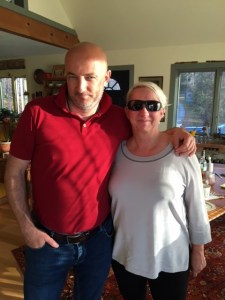
It is a career that took an abrupt turn on Feb. 24 — the day that Russia invaded Ukraine. Russian security services knew who Beliakov was because of his many years working in war zones. They had detained and interrogated him before. It was plain to Beliakov and his wife as soon as war broke out that Russian authorities would never tolerate legitimate journalism, and they would be certain to arrest him.
Beliakov was working on a major photo project in Armenia when the war began, and he never returned home to Moscow. His wife, Nellie, and their three children left their home behind, and he joined them in Bulgaria. Then, on Oct. 11, they flew from Istanbul to Boston, and the next day Lisa Chalidze of Benson, a town at the southern tip of Lake Champlain, brought them to a new home in Vermont.
It has been a wrenching turn for a journalist whose career has taken him to numerous war zones and exposed him to many close calls. But it was not an accident that he ended up in Vermont. Lisa Chalidze, a lawyer on the faculty of Castleton University, is the widow of Valery Chalidze, a Soviet-era dissident whom Soviet authorities banished after he had arrived in America on a lecture tour. That was in 1972.
Valery Chalidze was a colleague of Andrei Sakharov, the nuclear physicist and human rights activist who won the Nobel Peace Prize in 1975.
Sakharov’s granddaughter, Marina Sakharov-Liberman, vice president of the Andrei Sakharov Foundation, now runs a program helping those opposing the Ukraine war to emigrate. Lisa Chalidze is a member of the foundation’s board of directors, and with the foundation’s support in obtaining visas, and with Lisa’s help in finding them a new home, the Beliakov family has made its way safely to Vermont.

During a long and animated conversation over lunch at Lisa Chalidze’s home, Beliakov recounted the harrowing moments of a long career covering seven conflicts, mostly on the periphery of Russia.
For a moment, however, he paused, reflecting on the fact that two revered champions of human rights, Sakharov and Chalidze, through their granddaughter and widow, have allowed his family to reach safety in America. It was a thought that caused him to put his face in his hands for a moment to regain his composure.
Beliakov, 52 years old, has practiced journalism at the highest level, working for The Sunday Times of London, Der Spiegel in Germany, Bloomberg News, The Wall Street Journal, The New York Times, The Washington Post, Le Figaro, Paris Match and numerous other outlets. His photographs have won awards and been exhibited internationally. He has prided himself on covering both sides in the many conflicts he has witnessed — including that which began in the Donbas region of Ukraine in 2014.
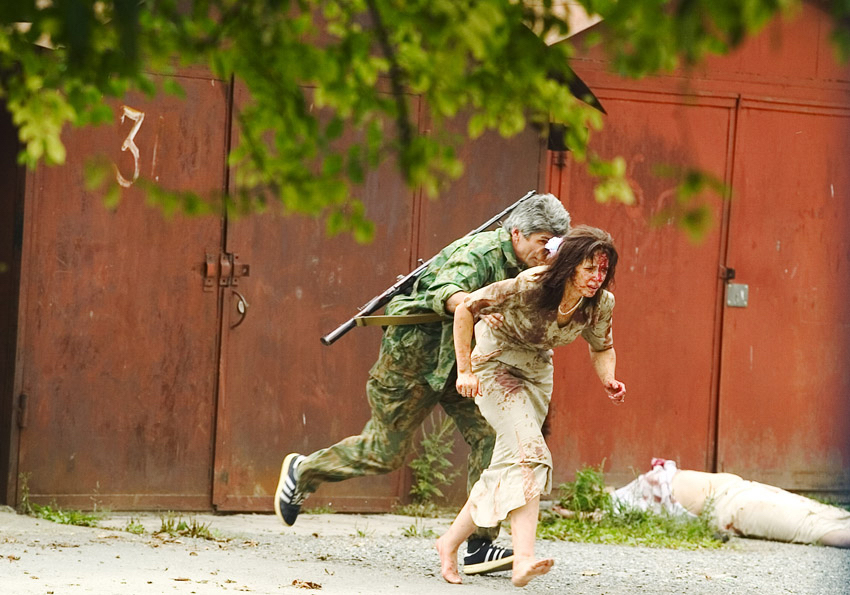
The notable moments in his career have been many, but an important one occurred in 2004. It happened when terrorists seized a school in the Russian town of Beslan and held it for three days until a massive explosion ended the siege, claiming 330 lives, including those of 186 children.
Beliakov’s photos were iconic representations of the event, including a sequence showing a 6-year-old girl who was blown out through a window of a large building. Most of her clothes have been blown off, and she is seen rising from the ground next to a woman’s body and then trying to climb back into the building, where she hoped to find her mother.
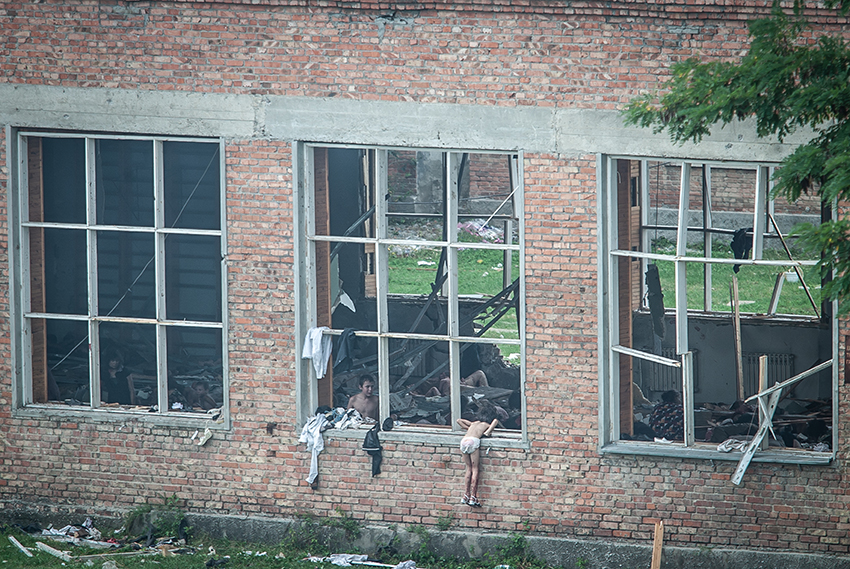
The images of the girl, Aida Sidakova, have been likened to the famous photo of the Vietnamese girl, running naked in flight from a napalm attack. The girl and her mother survived, and Beliakov has photos of them years later, looking healthy and happy. CBS later made a documentary about the Beslan siege called “Three Days in September,” narrated by Julia Roberts, with Beliakov prominently featured.
Another notable event occurred in 2014 in the Donbas region of eastern Ukraine. Pro-Russian insurgents had seized a local resident, Iryna Dovhan, saying she had been spying for Ukrainian forces. A photo showing her mistreatment came to the attention of United Nations human rights monitors, and Beliakov, with his friend Mark Franchetti, a reporter for The Sunday Times of London, pleaded with the pro-Russian rebel leader to release her. They appealed to his conscience, Beliakov said. Their intervention won her release.
Danger has been a constant in Beliakov’s work. In Syria, he said, he had planned to be with the American war correspondent Marie Colvin in the city of Homs on the day in 2012 when she died in a mortar attack. But his plans had changed.

He recounted six times when he found himself in life-threatening situations — missing in the mountains of the Chechen-Georgian border, surviving air strikes in Chechnya and Nagorno-Karabakh, surviving heavy artillery and mortar bombardment in Ukraine.
Beliakov said he had traveled to the North Caucasus more than 50 times and is one of only two Russian photographers to document the second Chechen war from all sides — the Chechen armed resistance, regular Russian troops, pro-Kremlin Chechens.
Practicing neutrality as a journalist has been complicated. Independent journalism in Russia has been quashed. At the same time, Ukraine has so far refused to grant him a visa to enter the country to cover the present war, presumably because he is Russian.
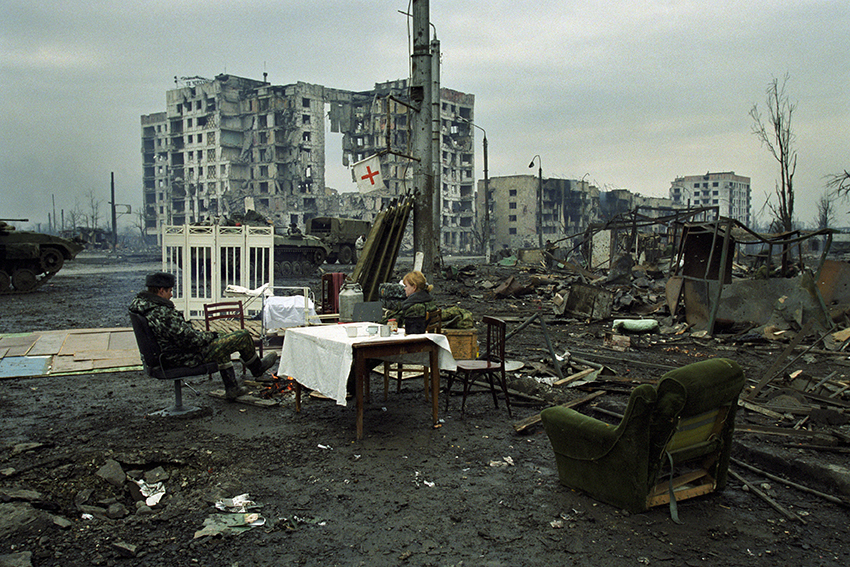
But his work has encompassed more than war coverage. His many projects include one called “Last Witnesses of Stalin’s Largest Mass Exile,” with stunning portraits of men and women driven by Stalin in 1944 from Ingushetiya in the Caucasus to exile in Central Asia. One man was said to be 115 years old. They are ancient survivors of Stalin’s policy of forced migration who years later were allowed to come home.
That Putin today is engaged in forced migration in Ukraine is an unsettling parallel.
Now Beliakov is trying to reconstitute his life in Vermont. His children are 26, 15 and 12 years old, and Dmitri is working to negotiate the bureaucratic steps needed to obtain Social Security numbers, driver’s licenses and telephones for them. A generous Rutland County resident has provided them with a home on a remote mountain road.
At Lisa Chalidze’s house that afternoon, his son Sergey, 12, was with him — a good-natured boy who likes soccer and fantasy books, but who has seen his family uprooted and transported to another continent. He seems to have responded with equanimity. With his father translating, he said of his family’s journey: “Everything has been registered in my mind. I remember every episode in its way. But there’s no discomfort.”
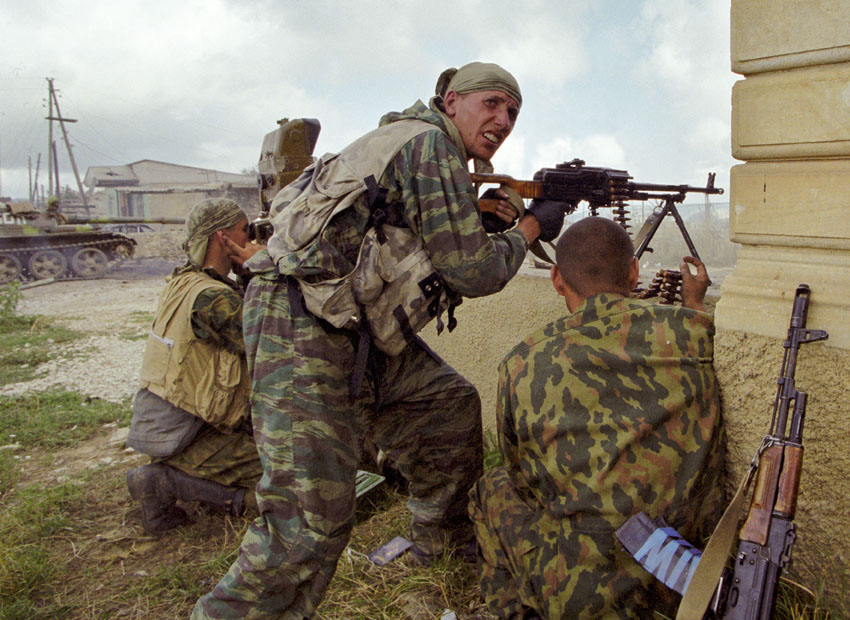
Dmitri Beliakov said of his son, “He has lost quite a lot of illusions.” Dmitri’s other children are Kirill, 26, and Varvara, 15. He said they have matured during a difficult period transformed by war and its effects.
Beliakov himself takes a dark view of Vladimir Putin and the catastrophe he has caused. “I think too much power turns men dark, and Putin is a classic example,” he wrote me in an email. “He is an excessively vain character who’s trying to look bigger than he is. Under Putin’s rule, Russia has taken a very nasty turn.”
Friends and fellow journalists have been murdered in Russia, and Beliakov has lost hope for journalism there. “The whole phenomenon of journalism was compromised in Putin’s Russia; no one believes a journalist anymore, and no one really understands what the journalism is about.”
Of the present war, he said, “Conflicts expose and reveal the truth. Conflicts allow us to speak out. I wasn’t silent; I spoke freely about how I feel about this aggression in my interviews, articles and in the social networks.” He knew it would blow back on him and his family, and he decided it was impossible to live and function as a journalist in Russia. Like thousands of other Russians, he and his family have left.


Now Beliakov has gained an appointment as a research fellow at the Peace and War Center of Norwich University. Dr. Travis Morris, director of the center, said Beliakov would be a valuable resource for the center and for the university as a whole. At the Peace and War Center, Morris said, “the goal is peace, but in reality, that’s not how the world works.”
Beliakov knows how the world works when peace fails, and his experience of war’s cruelty offers many lessons. The Peace and War Center sponsors research, promotes student engagement and serves as a forum for diverse voices, and Beliakov will have much to offer, Morris said.
In a period in which anti-Russian sentiment is at a high level, would Beliakov be subject to bias against him?
“I’ve already seen it,” Morris said. “It’s one of the reasons why he’s here” — to hear from a Russian who finds Putin’s war abhorrent will be a valuable lesson for the university community and beyond. Beyond the stereotypes, there is an “element of humanity” that Beliakov embodies.
From his new home in Vermont, Beliakov monitors the war in Ukraine from afar and harbors fears about what Putin might do. He said he believes Putin “has basically lost it and has been driven to the edge.” He said the only one capable of buying more time and avoiding the worst is President Biden.
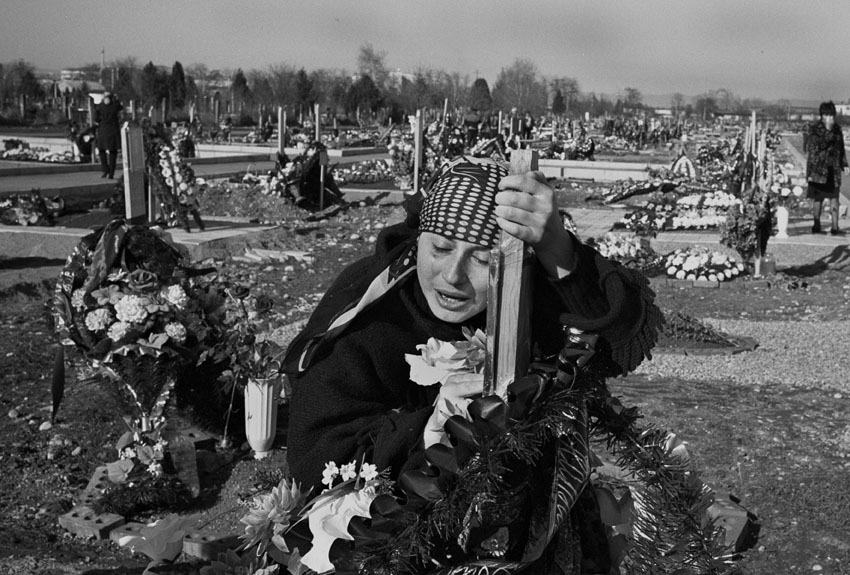
He said someone needs to talk with Putin the way an FBI negotiator tries to talk down a potential suicide. He said he believes the Russians have already placed a nuclear charge inside Ukraine, and the worst is possible.
Beliakov calls Lisa Chalidze his sister for all the help, logistical and otherwise, that she has provided. She calls him “little brother.” Chalidze herself continues to pursue activities meant to further the cause of democracy and human rights. She has donated her late husband’s archive to the National Parliamentary Library of the republic of Georgia, and she does work in Georgia to encourage the country’s fledgling democracy. She travels to South Africa every year for similar work.
She and the Beliakov family enjoy a kinship connected to the oppressive rule of Soviet or Russian leaders. Many people helped Valery and Lisa Chalidze during his exile, and she says her help for the Beliakov family is a way of “paying it forward.”
Thus, one of Russia’s most accomplished war correspondents is now far removed from any war, enjoying the sanctuary of Vermont, but with images in his mind and in his vast portfolio of the worst that human beings can do to one another. The displacement of his family is one instance of the cost that the war has brought to millions of others.
But he is looking ahead. “I am not a victim of political repression,” he told me by email. “Some of my colleagues and friends ended up in grave, some are in prison for doing the same job I did. I was luckier than some of them: I am alive.”

Corrections: The spellings of Nellie Beliakov and Aida Sidakova have been corrected.

